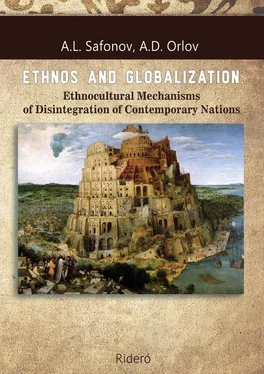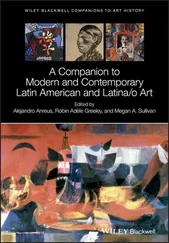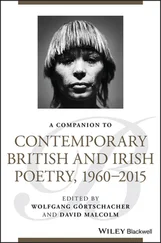4. The existence of powerful tendencies and processes of a divergent nature is one of the chief attributes of globalization, being a process of the establishment of the global environment of interaction and antagonism of social agents. Growing social differentiation and the fragmentation of local social communities and humankind in general is an inalienable part of divergent processes, which are attributes of globalization engendering major sophistication and a more fragile balance of the historical process.
5. Ethnic and ethnoconfessional fragmentation of large and highly organized local communities – in particular, nations and humankind in general – is an inalienable part of divergent processes and systemic social regression, which are typical of globalization.
6. Intensifying interaction among social agents, globalization objectively engenders increasing antagonism of all social agents and communities, including ethnoses and nations, which inevitably takes on a multi-dimensional, connected and therefore increasingly unstable system of interacting crises strengthening one another.
7. One attribute of globalization is the global increase in the number of phenomena of social regression, a symptom and mechanism of which is ethnic fragmentation of the social community and, correspondingly, primitivization and archaization of system-building, social communities and institutions of the industrialized era, and increasing importance of the role of ethnoses and social institutions typical of them.
Chapter II. Notions of ethnos and nation as basic categories of sociophilosophical discourse
2.1. Genesis and evolution of notions “nation” and “ethnos” as categories of philosophical discourse and historical perspective
To analyse patterns of the appearance, establishment and development of such social communities as ethnos and nation that manifested themselves under the influence of globalization processes, one should look into the genesis and evolution of such concepts as “nation’ and “ethnos’ as categories of sociophilosophical discourse, which will allow us to differentiate given theoretical categories and the social phenomena behind them.
The semantics of the concepts in question are comparable in the context of various languages and cultures, where they may have not only different shades of meaning, but often very different meaning in general. It is important to differentiate the almost identical notions of, for example, “nation’ in English and “нация” ( natsiya ) in Russian.
The meaning of the word “nation’ and related notions differs in various European languages, in particular in French and in German, where the difference in meaning stems from the history of the formation of German and French political nations. While France was formed as a synthesis of historical provinces heterogeneous in terms of language and culture, Germany as a political agent was formed as a result of a political unification of German dukedoms, the population of which was disconnected politically but understood clearly the close links based on culture and history as well as on the German standard language that had by then been formed.
The English term “nation’ has its own cultural and historical particularities, which prove a pattern-like dependence of sociopolitical terminology on the concrete historical conditions under which it was formed.
So, “national’, often translated into Russian directly as “национальный” ( natsionalny : национальный Mузей – national museum; национальная безопасность – national security; национальная сборная – national team; национальная история – national history), in fact corresponds better to the Russian terms “state’ and “peoples’, whereas национальный in Russian is widely used when speaking of ethnic minorities and ethnic territorial autonomies included in a federation.
Illustrative cases have been known where a notion borrowed from the English political vernacular via a direct translation, such as natsional’naya bezopasnost’ (national security), is then understood in the scientific and expert community of national-territorial regions of Russia as the security of the state-forming nation (in fact, the state-forming ethnos) of a certain region, but not as a security of the state in general, as it was in English language.
At the same time, the existence of cultural and linguistic particularities in the interpretation of the term “nation’ only highlights the fact that the term has a stable range of meanings, shared by various cultures, on which, according to the author, the objective existence of nations as social communities is based.
In a historical retrospective, the concept of “nation’ that has entered all European languages cam stemmed from the Latin nasci which meant “birth’ and was contrasted by Roman citizens with “barbaric’ communities based on family and tribal relations and common law.
Thus, the term “nation’ appeared and was used in Ancient Rome attached to a meaning rather close to the contemporary one, especially during the emperors’ Rome with its developed civil society and watered-down Roman ethnos.
After the Western Roman Empire fell, feudal states that appeared on its former territories took on, along with the Latin language as a universal European lingua franca, the dichotomous use of two words, natio and gens (the latter directly translated as “tribe’) to designate civilized (Christian) nations as opposed to barbarians (pagans).
It is especially important that the original natio-gens dichotomy, highlighting the difference between the developed civil society of the empire of Rome and the primitive social institutions of the barbaric periphery of Rome, finding itself at the stage of dissociation of the tribal lifestyle, echoes the modern nation-ethnos dichotomy.
This becomes all the more important in light of the fact that the Greek word ethnos , introduced into the wide scientific vernacular not so long ago, has, in reality, almost the same meaning as the Latin gens , denoting cultural and genetic commonality with undeveloped political institutions (at the pre-state development stage) or taken without consideration of the political component.
It is also important to consider the medieval period in order to differentiate clearly between the concepts of “ethnos’ and “nation’. Characteristically, tribes (to be more precise, tribal nobility, elites) of the former barbaric periphery of Rome that were part of the empire of the Carolingian dynasty which gave names to historical provinces and feudal dukedoms (the Burgundians, the Lotharingians, the Bretons, the Franks, the Bavarians, the Saxons and others), insisted on calling themselves “nations’ for a long time after the Western Roman Empire collapsed.
Obviously, in calling their lands “nations’, feudals did not emphasize the ethnocultural particularities of their subjects. They were raising their political status within the Holy Roman Empire from provincial or even tribal to imperial. Thus, medieval political elites legitimized their political ambitions to subjugate and swallow neighbouring political entities.
Thus, in the early medieval period, the concept of a nation ( natio ) as a social unity was inseparable from the state and political component, basic institutions of which were directly inherited from Rome, but was at the same time linked to local political entities and historical provinces typical of the Middle Ages.
At the same time, the use of the natio concept was linked to feudal entities’ claims for territorial and political expansion, at the very least a new level of political sovereignty, which is exemplified by the history and titling of the hold-over of the empire of Rome, the Holy Roman Empire, later the Holy Roman Empire of the German Nation (Sacrum Imperium Romanum Nationis Germanicae, Sacrum Imperium Romanum Nationis Teutonicae) or, in German, Heiliges Römisches Reich Deutscher Nation. This complicated political aggregation of feudal states that existed in 962—1806 and in its most prosperous period included Germany, Northern and Central Italy, the Netherlands, the Czech Republic and some of the French regions.
Читать дальше












